Coconut milk is a thick, creamy, and dairy free beverage that’s high in fat and low in carbohydrates and sugar.
In its natural state, it is energy-dense and high in MCT oil, which have been studied both for weight loss and for cardiovascular benefits.
Coconut milk is also incredibly popular among people who adhere to a ketogenic or low-carb/low-sugar diet, since almost all of its calories come from fat.
Our research team has ranked the ten highest-quality brands of coconut milk—read on for details.
Research
Rankings
1. Roots Circle Coconut Milk
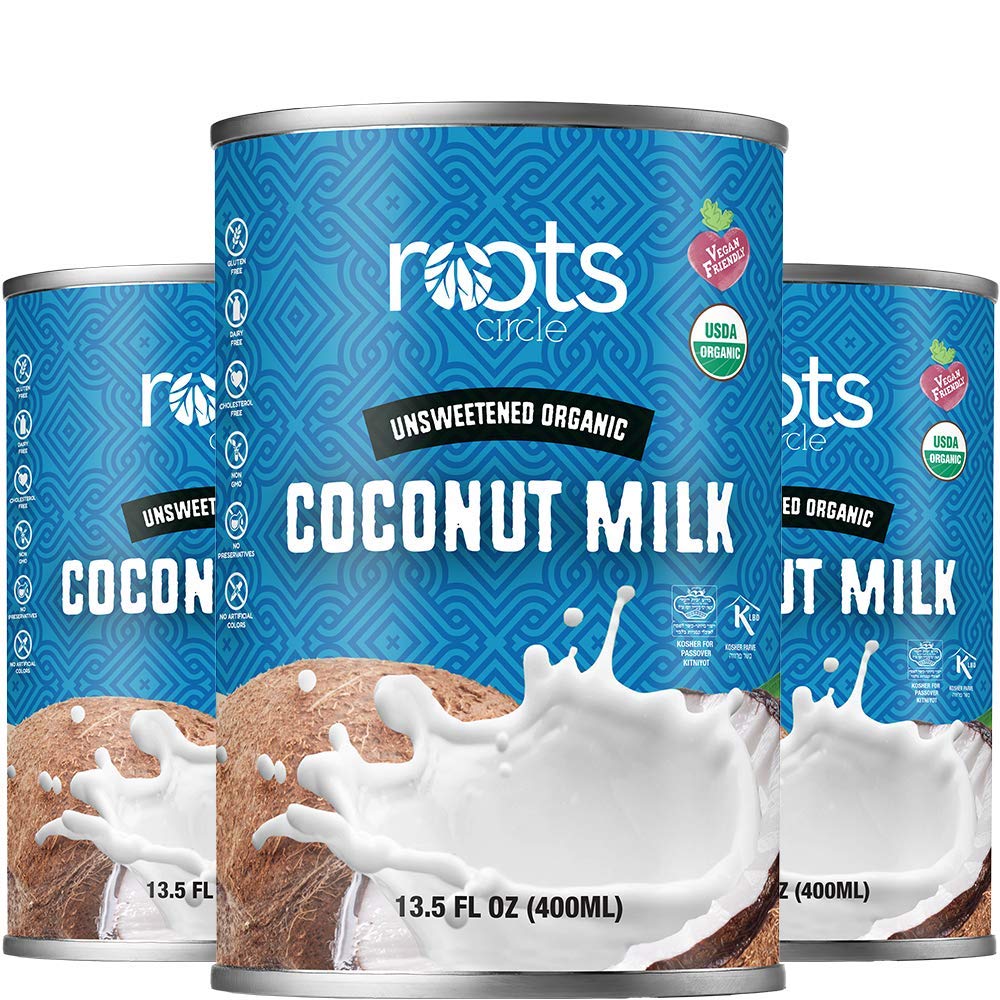
Roots Circle Coconut Milk is thick, creamy, and totally unsweetened. For a simple coconut milk that’s well-suited for cooking, baking, acai bowls, and more, it’s hard to go wrong. With this level of versatility, it decisively takes our top spot. If you’re looking for a drop-in replacement for regular milk, check out our next recommendation, but for nearly everything else, Roots Circle is a great starting place.
2. Coconut Dream Original Enriched Unsweetened
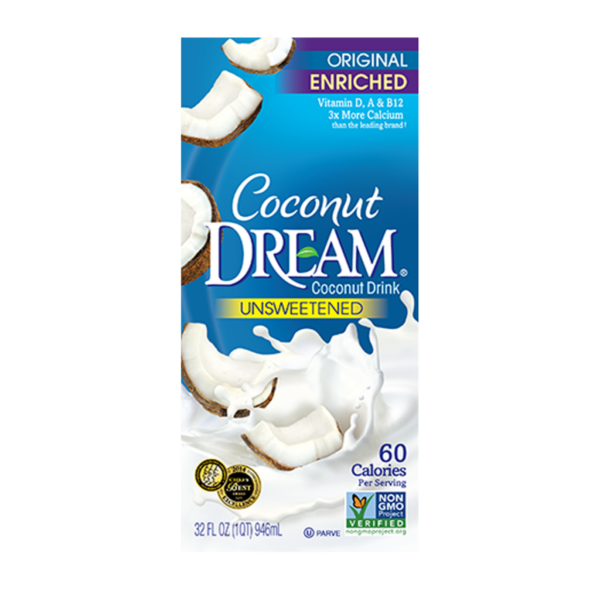
Coconut Dream is a great choice if you want an unsweetened full-strength coconut milk that still has the nutrients you’d get in cow’s milk, like calcium and vitamin B12.
There’s less than a gram of carbohydrates per serving, so this is a great source of fat energy if you are on a ketogenic or low carb diet. These features make it an all-around strong pick.
3. Anthony’s Organic Coconut Milk Powder
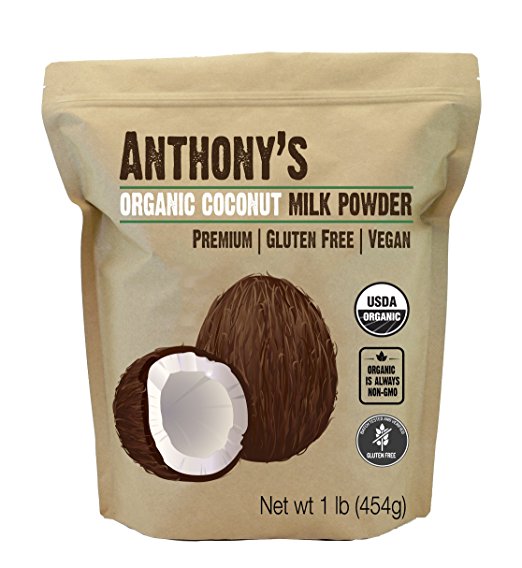
Anthony’s Organic Coconut Milk Powder is a distinct take on coconut milk—you can think of it like the condensed milk version of coconut milk.
This powder-based coconut milk concentrate can be whipped with hot water and your favorite sweetener to make a great-tasting low-carb whipped coconut cream, or added to coffee for an instant boost of medium chain triglycerides.
It’s certainly got its own niche, but Anthony’s Organic Coconut Milk Powder is an excellent product for its specialty uses.
4. Aroy-D Coconut Milk
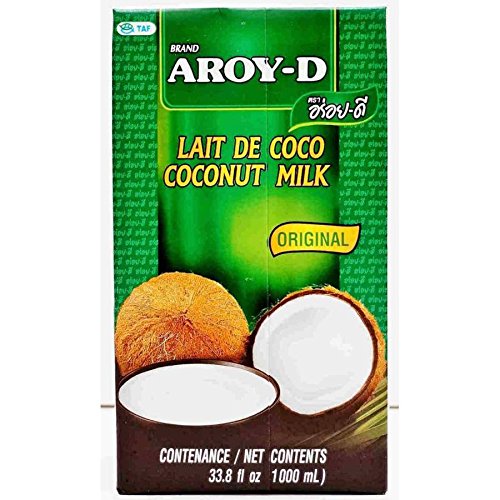
Aroy-D Coconut Milk is imported straight from Thailand, and as such it’s as close to a traditional coconut milk as you can get.
The only ingredients are coconut and water, so it’s free of emulsifiers and flavoring agents, but also the kind of fortified nutrients you’d get in a coconut milk designed for dairy substitution.
The single-use tetra pak containers are also a convenient improvement over other products which still use steel cans, so go for this product if you want a pure coconut milk that you can use in small amounts on a regular basis without having to worry about resealing and storing a single large container.
5. So Delicious Vanilla Coconut Milk
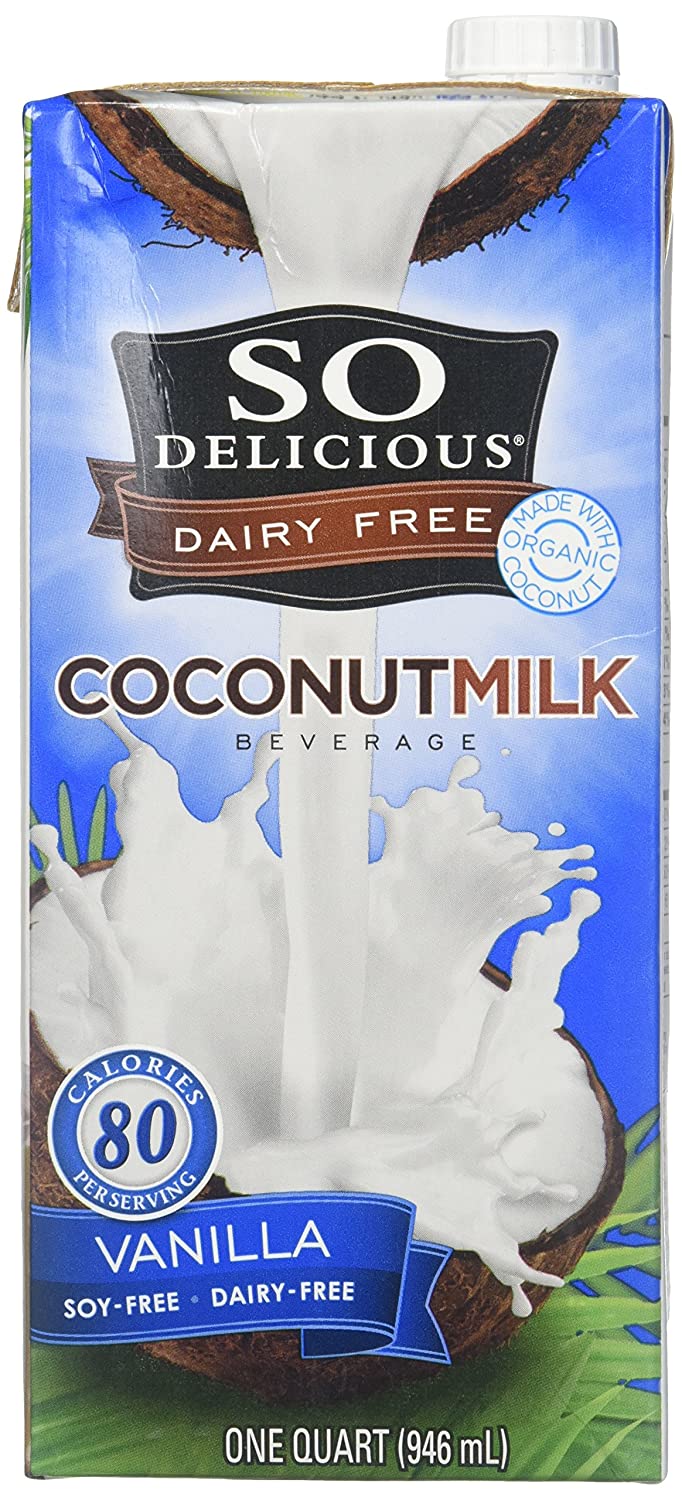
So Delicious Vanilla Coconut Milk is a great option if you’re not quite ready for the milder, tropical flavor of unsweetened coconut milk. It’s a sweet-tasting drop-in replacement for cow’s milk, albeit at the cost of eight grams of sugar per serving. Not the worst, but it isn’t a good option for people on the keto diet, on a low carb diet, or who are looking to lose weight.
6. Thai Kitchen Organic Coconut Milk
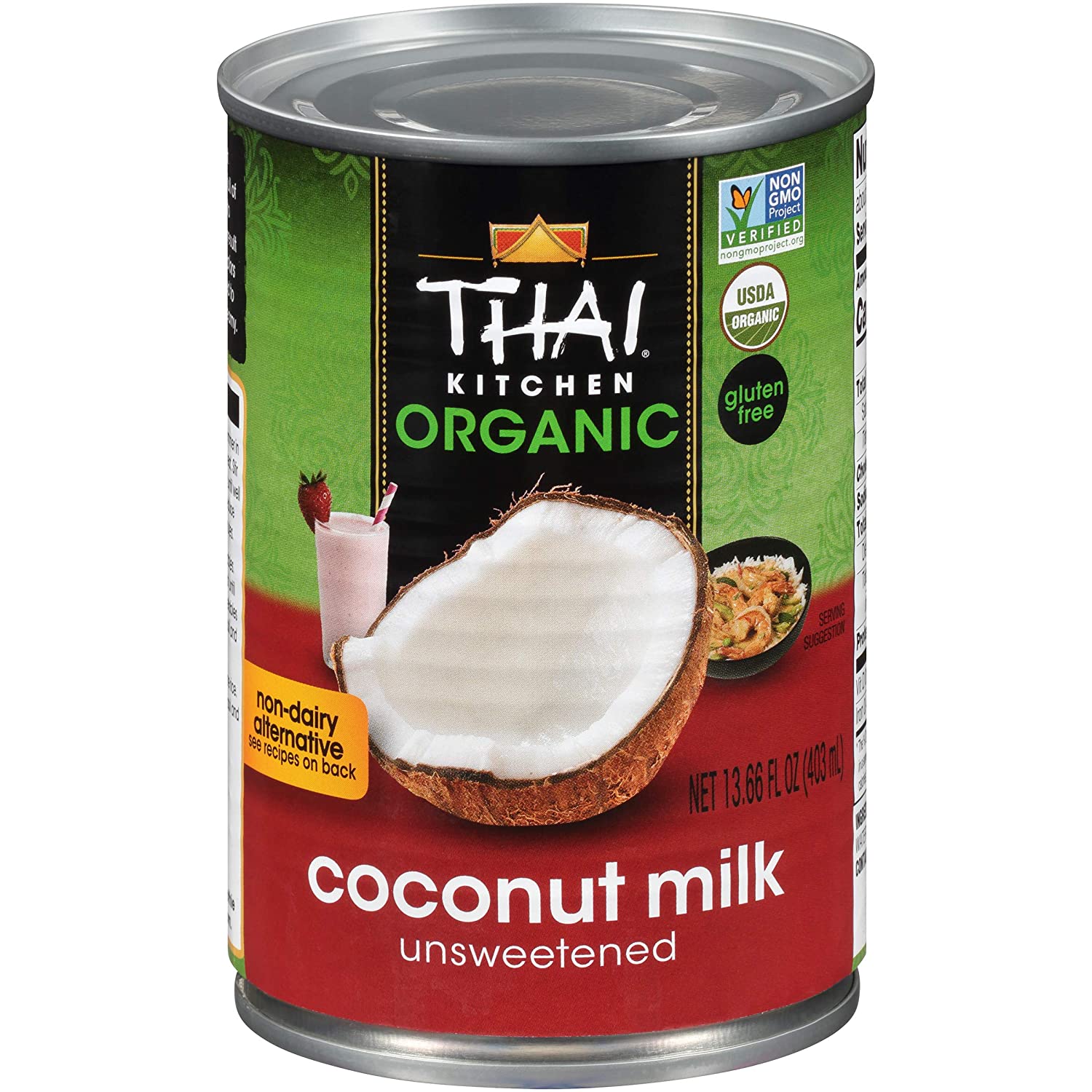
Thai Kitchen Organic Coconut Milk is a super-simple coconut milk that includes only water, coconut cream, and guar gum to help keep the coconut fats mixed well with the water (though it’s not always effective).
It’s great for cooking, but the lack of fortification with things like vitamin D and calcium make it a poor dairy milk substitute, unless you already get those nutrients in adequate amounts elsewhere in your diet.
Still, for people looking for a super-pure coconut milk and don’t mind having to shake up the can before use, it’s a decent option.
7. Natural Value Organic Coconut Milk
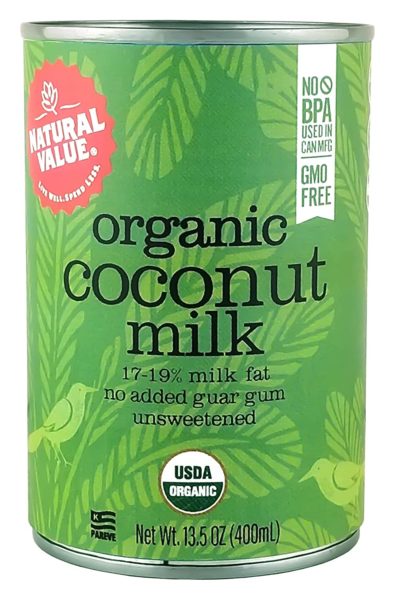
Natural Value Organic Coconut Milk is a pure and simple coconut milk preparation that only includes coconut and water.
There are no emulsifiers, which means no additives but worse fat/water separation, and no added vitamins or minerals, which is good if you are striving for purity, but not so good if you want to use this as a dairy substitute.
It does use organic coconuts in its manufacturing process, so it’s one of the better picks if you want purity above all else.
8. Native Forest Unsweetened Organic Coconut Milk Simple
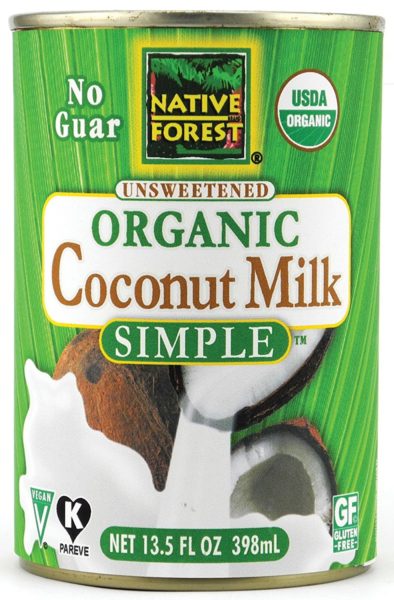
If you want to keep things as simple as possible, it’s hard to do better than Native Forest. Coconuts and water are the only ingredients in this coconut milk product, which has both benefits and drawbacks.
Purists will like the lack of emulsifiers like guar gum, but on the other hand, you won’t get the benefits of the nutrients you’d get in a fortified coconut milk, like calcium or B vitamins.
If that’s not a problem, and you don’t mind dealing with some fat/water separation, Native Forest is a great product.
9. Pacific Foods Barista Coconut
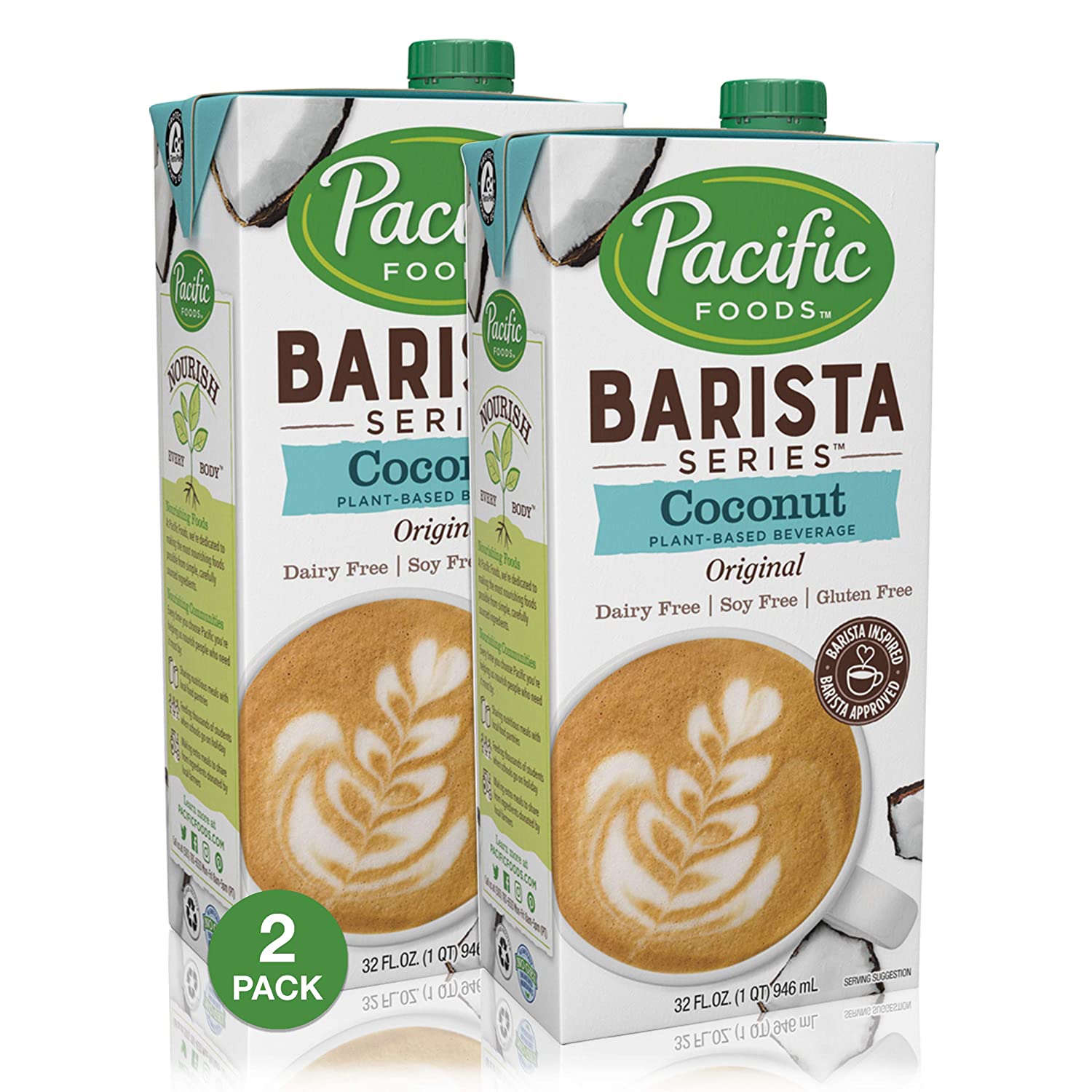
Pacific Foods Barista Coconut fills a very specific niche—people looking to replace milk in their lattes with coconut milk. To this end, it’s got sweeteners and flavoring agents you wont’ find in regular coconut milk, but for the specific use-case of lattes, coffee, and other hot caffeinated drinks, it is pretty handy.
10. Z Natural Foods Organic Coconut Milk Powder
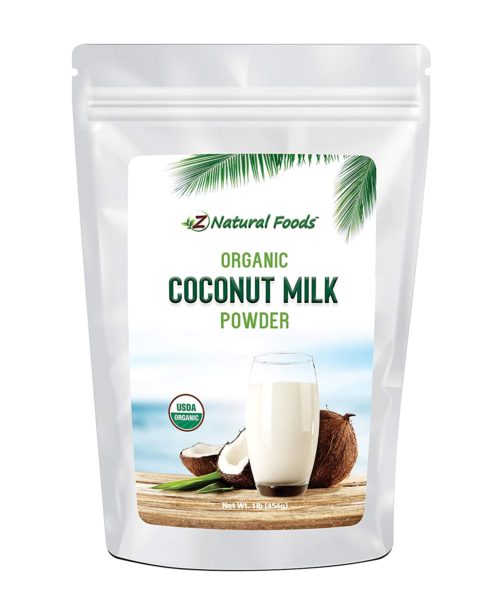
Z Natural Foods Organic Coconut Milk Powder can be used as a milk replacement for making whipped cream, lattes, or smoothies, but it’s not the best powder-based product on the market.
It does have a tendency to clump up, and the use of maltodextrin as an anti-clumping agent raises the carbohydrate content, making this a slightly weaker choice for people on a keto or low carb diet.
Category winners
Best coconut milk overall: Roots Circle Coconut Milk
For all-around usage, it’s hard to beat Roots Circle Coconut Milk. It’s unsweetened, certified organic, and incredibly thick, making it great for lattes, acai bowls, and more. The only place you wouldn’t want to use it is as a drop-in replacement for cow’s milk—its thickness there is more of a burden than a benefit!
Best coconut milk for keto diet: Coconut Dream
If you’re on keto or a low-carb diet, Coconut Dream is the best replacement for your typical milk. It has less than one gram of sugar per serving, and is fortified with all the usual vitamins and minerals you’d get in milk: calcium plus vitamins A, B12, and D.
Best coconut milk with high MCT oil content: Roots Circle Coconut Milk
Many people want high MCT oil content in their coconut milk, and for these people we recommend Roots Circle Coconut Milk. It’s as close to raw coconut as you’re going to get, which helps preserve the MCT oil content, which can break down under heat.
Best sugar-free coconut milk: Coconut Dream
Since coconut milk became trendy, there are a lot of brands out there that have added sugar, rice syrup, and other sweeteners to their coconut milk to broaden its appeal. Not Coconut Dream. Their coconut milk is completely unsweetened, giving it a mild, tropical flavor and making it great for people on low-carb diets.
Best flavored coconut milk: So Delicious Vanilla Coconut Milk
Can’t get on board with the mild flavor of unsweetened coconut milk? So Delicious makes a great-tasting coconut milk that’s light on the sugar, at only eight grams per serving. It’s a nice option for people who are curious to try out coconut milk, but aren’t looking for something totally carb-free.
Best coconut milk for acai bowls: Roots Circle Coconut Milk
Coconut milk is a great base liquid for acai bowls, which pack an incredible amount of superfoods into a delicious meal (or meal replacement). Our favorite for this application is Roots Circle Coconut Milk, thanks to its pure formulation and lack of added sugar. For sweetness, you can easily rely on the sweetness provided by your favorite fruit, and if you want something a little more liquid, adding water or coconut water is an easy way to thin out this coconut milk.
Who should buy coconut Milk?
Coconut milk is safe for most individuals and is especially great for persons looking for a lactose-free alternative to milk or other dairy-based milk. It’s also great for persons following a low carb or keto diet since it mostly free of carbs unless it contains added sugar from the manufacturer.
Special populations such as pregnant women and diabetics should be careful when consuming coconut milk as it may cause adverse effects. Children should be fine to consume coconut milk, although you should speak to a medical professional before giving it to them.
How we ranked
Coconut milk comes in a variety of ways, such as liquid form, powder form, and condensed form. Powdered forms, like Z Natural Foods, are very convenient. However, they tend to climb and contain a lot of sugar and stabilizing agents, which is why we ranked them quite low. Anthony’s Organic Coconut Milk Powder was the exception since it is devoid of most sugar and additives. Its convenience, great taste, and purity let us rank it in our top 3.
Canned coconut milks, like Thai Kitchen and Natural Value, offered a lot of purity, making them great for cooking and baking. However, they are often not fortified with vitamins and minerals, making them less ideal as a dairy substitute. Canned coconut milk was also found to have traces of BPA, which was less than ideal. As such, they didn’t make the top 5 on our list.
When looking at coconut milks that were meant to be direct substitutes for dairy milk, we considered the sugar content, mineral fortifications, and additives. All the products needed to have mineral fortifications to make our list. Specifically, we wanted to see various vitamins, such as vitamin D3 added, as well as some minerals. In terms of sugar content, less was more. We axed popular products that contained similar sugar levels to soft drinks, despite them being delicious. Products like So Delicious and Aroy-D ranked well here for providing less than 10g of sugar per serving. Roots Circle took the top spot for offering a great taste, with low sugar levels and minimal stabilizing agents.
Benefits
Coconut milk is rich source of beneficial medium chain triglycerides (MCTs). One particular category of fat that’s contained in coconut milk is medium chain triglycerides, also known as MCTs.
MCT has been associated with numerous health benefits, which explains the popularity of MCT oil products. MCT is known to help decrease body fat and fight against some of the unhealthy metabolic changes that happen in conjunction with weight gain.
For example, one study published in the scientific journal Obesity by scientists at McGill University in Canada (1). Their study had 24 overweight and obese men participate in a crossover trial that included 28 days with an MCT supplement and 28 days with a long-chain triglyceride supplement as a control.
The researchers found that the MCTs were associated with an increase in energy expenditure and a decrease in body fat levels, compared to the long chain triglyceride control period. Another study published in 2010 in the journal Pharmacological Research connected MCTs with improvements in metabolic function (2).
The researchers were interested in metabolic function because metabolic syndrome and type 2 diabetes are both metabolic disease that are associated with being overweight or obese.
The study reviewed multiple different experiments by other researchers which showed a range of improvements in parameters like fat deposition, fat oxidation, and insulin sensitivity.
As a good source of MCT oil, coconut milk appears to be beneficial for both weight loss and for avoiding the metabolic effects of high body fat.
Although saturated fat consumption is usually associated with cardiovascular disease coconut milk might be an exception. Some of the biggest and most rigorous epidemiological studies conducted in the Western world have consistently found that saturated fat intake is associated with an increase in cardiovascular disease.
It’s also been associated with a concomitant increase in risk factors for cardiovascular disease, like high blood pressure and and high cholesterol.
Authoritative meta-analyses from respected and unbiased authors such as the Cochrane Collaboration have confirmed these results: according to a large meta-analysis published in 2015, increases in saturated fat intake are associated with increases in cardiovascular disease risk, especially if saturated fat is displacing unsaturated fat in your diet (3).
However, saturated fat is a fairly large category of fats that includes the kind of fat found in everything from bacon grease to coconuts.
As you might guess, these don’t all contain the same molecules, even though they fall under the umbrella of saturated fat.
Observational studies have not connected coconut milk with higher risk of heart disease. Since coconuts and coconut milk are a traditional food in Southeast Asia, many island nations provide good natural experiments for testing to see whether the saturated fat in coconut milk actually increases the risk of heart disease.
A number of studies have concluded that, in traditional societies, even extremely high coconut consumption is not associated with cardiovascular disease.
One such study, published in the American Journal of Clinical Nutrition by researchers in New Zealand, compared two populations of island dwellers in Polynesia (4).
The citizens of one island got 34% of their calories from pure coconut, while the other island got 63% of their calories from coconut.
Interestingly, though there was a modest increase in cholesterol levels on the island with greater coconut intake, the authors noted that cardiovascular disease was not a major health problem on either island, suggesting that even these extreme levels of coconut consumption.
Additional research published in 2004 in the Asia Pacific Journal of Clinical Nutrition found similar results in Indonesia (5).
The researchers compared the dietary intake of people with heart disease to a similar group of healthy people. They found a number of similar findings to studies done in Western populations: increased intake of animal protein and cholesterol were associated with a greater likelihood of cardiovascular disease.
Notably, however, there was no association between coconut intake and heart disease, either in the form of raw coconut or in the form of coconut milk.
Coconut milk might not be a good choice if the rest of your diet and lifestyle is not very healthy. Not all researchers are convinced by the results in islander populations.
One review study published in 2016 in the journal Nutrition Reviews surveyed a number of studies on coconut intake to determine its health effects (6).
The authors conceded that coconuts appear to be a healthy and non-harmful part of the diet of many traditional island societies, but the evidence for using coconut milk or coconut oil by itself as a dietary intervention in Western populations is less convincing.
The researchers hypothesized that the saturated fat in coconut products might interact with other negative parts of Western lifestyles, like high refined carbohydrate and sugar intake, as well as low levels of physical activity, could interact with the fat content of coconut milk to create adverse health outcomes.
Side effects
Coconut milk is derived from a food that’s part of the staple diet of many cultures, so its side effects are limited to special populations or excessive consumption.
Like any coconut product, consuming extreme amounts of coconut milk can cause gastrointestinal problems, and because of its high saturated fat content, it may be inappropriate for people with medical conditions that affect your ability to metabolize fat in your diet, like gallbladder disease and pancreatitis. For the same reason, it might interact poorly with fat blockers in weight loss pills like Alli.
Recommended intake
With so much controversy over coconut milk, it’s hard to pin down a precise optimal intake.
Even if you do ascribe to belief in the negative effects of high saturated fat intakes, amounts of eight to 16 oz of coconut milk should still be healthy, as long as you don’t have other sources of saturated fat in your diet.
Clearly, the studies on island-dwellers have found that it’s possible to be healthy with extremely high coconut milk intake, but other lifestyle and dietary factors might contribute to this.
If the rest of your diet and your lifestyle are typical of Western residents, you might want to keep coconut milk consumption lower.
FAQ
Why is coconut milk a popular beverage for keto diets? Coconut milk is a traditional drink in Southeast Asia that’s made by boiling water with ripe coconut flesh. The result is a thick and creamy liquid that’s high in medium chain triglycerides and almost devoid of sugar.
As such, it’s become a very popular food to add to low carb and ketogenic diets, because almost all of its energy content comes from the saturated fat content. However, this has also made coconut milk somewhat controversial—proponents cite its high MCT oil content as evidence for its benefits, while others point to the drawbacks of diets that are high in saturated fat.
What is the difference between coconut water and coconut milk? Coconut milk is the flesh of a coconut, pureed with water, and then strained to create a creamy and rich liquid. White and opaque in appearance, coconut milk contains iron, selenium, sodium, calcium, magnesium, phosphorus, potassium, and vitamins C, E, B1, B3, B5, and B6. It is also higher than coconut water in calories and saturated fat. Unlike coconut water, coconut milk is also a popular ingredient in cooking and baking.
Coconut water is the thin liquid found within the coconut. Compared to coconut milk, it is much lower in calories and fat. It also contains sodium and potassium, which can help balance body fluids after a bout of exercise. It’s also a very clear liquid, which coconut milk is not.
What is the difference between coconut oil and coconut milk? Coconut oil is produced when pressing coconut meat for its milk. This substance rises to the surface due to the higher fat content.
What are some alternatives to coconut milk? There are many other plant-based kinds of milk that are similar to coconut milk that are also frequently vegan, gluten-free, and dairy-free. Options you may consider include almond milk, soy milk, hemp milk, quinoa milk, rice milk, pea milk, and flax milk. Another option to coconut milk, which is not vegan or plant-based, is goat’s milk.
What is a coconut? Despite many believing that coconut is a nut, a coconut is actually a fruit found as part of a coconut palm. It has a hard shell with a soft interior, known as the coconut meat, and a liquid center, which is coconut water.
Is coconut milk a suitable substitute for breast milk? No, coconut milk should not be used as a substitute for either breast milk or infant formula. It does not contain the wide range of nutrients required for infant growth and development.
Why does coconut milk often contain guar gum? Guar gum is often included in coconut milk because it acts as a stabilizer. This maintains the coconut milk’s creamy texture. Guar gum is a natural substance that is made from milled guar beans.
How does coconut cream differ from coconut milk? While coconut milk is the result of pressing coconut flesh for its liquid, coconut cream is made from coconut meat heated in water. In fact, diluted coconut cream is sometimes used to make coconut milk. Coconut cream is most suitable for desserts and rich sauces. Other variants include cream of coconut and creamed coconut, which both vary in consistency, as well as fat and sugar content.
How can I use coconut milk for cooking? Coconut milk is a great choice for homemade soups as it adds a creamy texture and flavor. Coconut milk can be added to smoothies to create a smooth, creamy base to which fresh or frozen fruits can be added. Coconut milk is further suitable in both sweet and savory dishes, including for creamy sauces and soups.
Can coconut milk be a substitute for milk in recipes? Yes, you can substitute regular milk for coconut milk in many recipes. The only thing you will want to pay attention to is whether or not the coconut flavor may alter the other flavors in the specific recipe you are making.
Where are coconuts grown? Coconut trees are flexible in the type of soil they grow well in, but they do require substantial rainfall. Most coconut trees grow on the island and coastal areas in Fiji, Samoa, India, Brazil, Sri Lanka, Philippines, Thailand, Vietnam, Papua New Guinea. Indonesia leads the world in coconut production.
What are the nutrients contained in coconut milk? The nutrients contained in coconut milk can vary depending on the brand of coconut milk you are using. For example, if sugar has been added, the sugar content will be higher than that found naturally in coconut. Some coconut milk brands also fortify their milk with various nutrients.
One cup of fresh raw coconut meat contains 283 calories, 12.2 grams of carbohydrates, 7.2 grams of dietary fiber, 5.0 grams of sugar, 26.8 grams of total fat, of which 23.8 grams is saturated fat, and 2.7 grams of protein. Fresh, raw coconut meat is also a good source of iron, manganese, and selenium (7).
In comparison, one brand of coconut milk (Native Forest), for the same 1 cup serving size, contains 420 calories, 45 grams of total fat of which 64% comes from saturated fat, 6 grams of carbohydrates, no dietary fiber, no sugar, and 3 grams of protein. This brand of coconut milk has 10% of recommended daily dietary iron.
The United States Department of Agriculture has provided its analysis of the nutrient content of raw coconut milk, also based on a 1 cup serving size (8). The department of agriculture found that raw coconut milk generally contained 552 calories, 5.5 grams of protein, total fats of 57.2 grams, 13.3 grams of carbohydrates, and 5.28 grams of total dietary fiber. The USDA also determined that raw coconut milk has 8.02 grams of sugars and no cholesterol. However, it is important to read nutrition labels to know exactly what the coconut milk contains, since the nutrition may vary from brand to brand.
What are some non-dairy alternatives to coconut milk? There are now many other plant-based and non-dairy kinds of milk available, including almond milk, oat milk, soy milk, rice milk, and cashew milk. Almond milk is made from finely ground almonds and water, and like coconut milk, it is gluten and dairy-free. Some individuals further find that almond milk is easier to digest than coconut milk.
Oat milk is made from the grain. While it may be higher in fiber than coconut milk, oat milk may contain gluten, so it may not be a suitable choice for those with celiac disease or those with gluten intolerances. Soy milk is another vegan choice and is an option for those with lactose and gluten sensitivities. Soy milk also contains protein in amounts similar to that of dairy milk, which is unlike coconut milk. Rice milk is another alternative, made from milling either white or brown rice and then mixing with water. Rice milk is also suitable for those with allergies to dairy, gluten, soy, and nuts. Lastly, cashew milk offers yet another choice and is low in calories, carbohydrates, and sugar. However, it is also low in protein. Macadamia nuts, hemp, and quinoa are also plant-based options for milk.
Why is coconut milk packaged in both cans, bottles, and cartons? If you want to use coconut milk as a drink, it typically comes packaged in a bottle or carton and will have higher water content to allow for it to be used as a beverage. Coconut milk that is packaged in a can is usually a thick cream, suitable for cooking as seen in many Asian dishes such as curries.
When choosing your brand of coconut milk, consider your ability to recycle its container. Coconut milk packaged in cans may be lined with BPA, a common substance used to line metal cans, which have been linked to developmental and reproductive concerns.
Is coconut milk high in protein? No, coconut milk is not high in protein. While you may find a variety that is fortified, there are approximately just 3 grams of protein per 80 grams of coconut meat. Many brands of coconut milk contain some level of protein, but it is negligible as even coconut meat, from which coconut milk is pressed, only contains small amounts of dietary protein.
Is coconut milk better for the environment? The answer to that question depends on many factors. It is true that coconuts can retain carbon in the soil, but where you get your coconuts may involve long transport distances. If the source of your coconuts is a long distance away, the transportation of them may be harmful to the environment. However, the dairy industry contributes a significant amount of greenhouse gas emissions, which is harmful to the environment. In this instance, coconut milk may be a better choice environmentally than dairy milk. If you choose organic coconut milk, that means you have avoided the use of pesticides and herbicides during the growth of the coconuts.
How long is coconut milk good for? Generally, coconut milk in a can has a shelf life of two to five years. Other packaging may only last for six to 12 months. It’s important to always check the expiry date on any product you purchase. This ensures you don’t use potentially dangerous expired products and also guarantees freshness.
Is coconut milk safe to drink expired? Most types of coconut milk will remain good as long as they are unopened. In fact, some types may last for weeks or months past the expiry date. Once opened, they spoil rather quickly. Either way, make sure you check any expired coconut milk to ensure it is still good before using it.
Related articles
Recap
Coconut milk is a rich source of medium chain triglycerides (MCTs), which have a range of health benefits from assisting with weight loss to improving your metabolic health.
Coconut milk might also be exempt from the usual nutritional rules about saturated fat, as its specific fatty acid content differs widely from other sources of saturated fatty acids, like red meat.
Though nutrition research isn’t clear on whether there is an upper limit on healthy amounts of coconut milk, small to moderate amounts of coconut milk do appear to be healthy levels of intake.
For BodyNutrition’s #1 recommended coconut milk, click here.